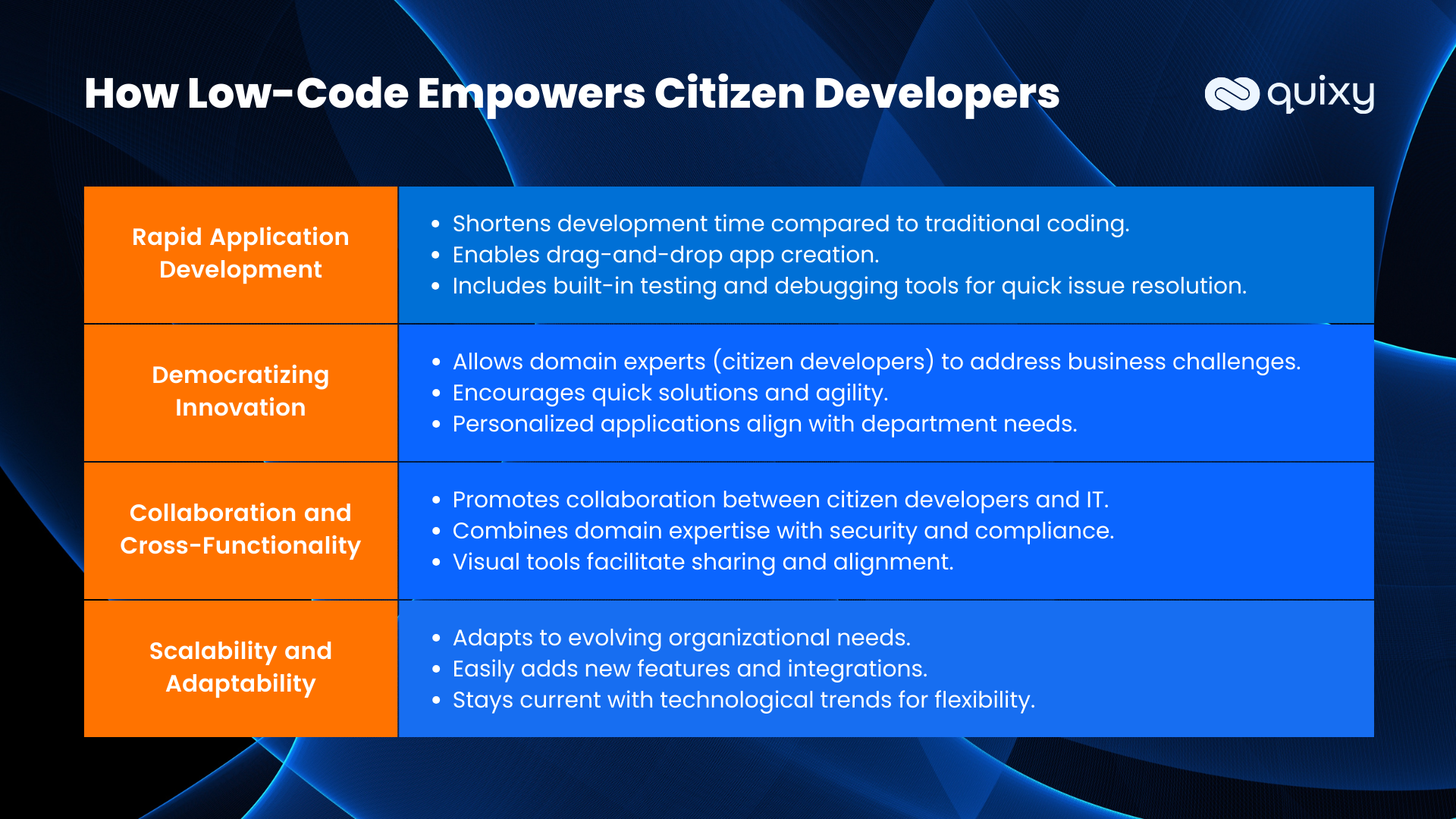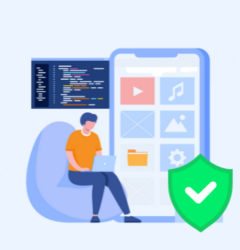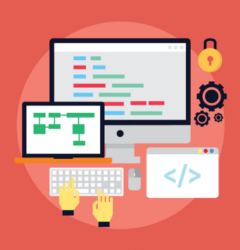
Low-code development has ushered in a new era of software creation, democratizing the process and enabling individuals known as “citizen developers” to take the reins in creating applications. This article will explore how low-code empowers these citizen developers and revolutionizes how software is built.
How Low-Code Empowers Citizen Developers
Citizen developers are not traditional programmers. They are individuals within an organization with domain expertise but may lack extensive coding skills. These could be business analysts, marketing professionals, or even frontline employees who understand the specific needs of their departments.

Low-code development platforms empower these citizen developers by providing a user-friendly visual interface that requires minimal coding knowledge. This accessibility is a game-changer, as it allows those closest to the business challenges to actively participate in solving them.
A survey by OutSystems, a leading low-code platform provider, revealed that 78% of IT professionals believe citizen development is rising in their organizations. This demonstrates the growing importance of empowering non-technical staff to contribute to software development.
Low-code app builders are revolutionizing the way businesses operate by rendering the traditional “run to IT” approach obsolete. These platforms empower non-technical users to create, modify, and deploy applications independently, reducing the dependency on IT departments. This shift not only accelerates application development but also enhances agility in responding to evolving business needs. With low-code, organizations can adapt swiftly, fostering innovation and streamlining processes, all while reducing the backlog of IT requests. It’s a paradigm shift that puts the power of application development directly in the hands of those who understand the business requirements best, ushering in a new era of efficiency and responsiveness.
Also Read: Top Benefits of Low-Code Development
Rapid Application Development
One of the key ways low-code empowers citizen developers is through rapid application development. Traditional software development can be time-consuming, requiring lengthy coding and testing phases. Low-code platforms drastically shorten this timeline.

With low-code, citizen developers can drag and drop pre-built components to create applications. This visual approach reduces the need for manual coding, allowing applications to be built in a fraction of the time it would take using traditional methods. This speed to market is crucial in today’s fast-paced business environment.
Moreover, low-code platforms often come with built-in testing and debugging tools, which means that citizen developers can identify and fix issues quickly, ensuring a smooth user experience.
According to MarketsandMarkets, the global low-code development platform market size is projected to grow from $13.2 billion in 2021 to $45.5 billion by 2026, at a compound annual growth rate (CAGR) of 28.1%. This highlights the increasing adoption of low-code platforms by organizations worldwide.
Democratizing Innovation
Citizen developers often deeply understand the specific problems they are trying to solve. Low-code platforms enable them to translate these insights into actionable solutions. This democratization of innovation means that solutions can be developed quickly, addressing unique business challenges with agility.
For example, a marketing professional could use a low-code platform to create a customer relationship management (CRM) application tailored to the needs of their department. This personalized approach ensures that the software aligns perfectly with the organization’s goals.
In a survey by Gartner, 41% of respondents stated that non-IT staff, including citizen developers, build significant applications in their organizations. This showcases the vital role citizen developers play in driving innovation.
Also Read: Demystifying Low-Code Development And Understanding Future Scope
Collaboration and Cross-Functionality
Low-code development doesn’t work in isolation. It encourages collaboration between citizen developers and IT departments. While citizen developers bring domain expertise to the table, IT teams ensure that the applications meet security, scalability, and compliance standards.
This collaboration is facilitated by the visual nature of low-code platforms. Citizen developers can create prototypes and share them with IT for feedback and implementation. This cross-functional approach ensures that the final applications are robust, secure, and aligned with the organization’s broader technology strategy.
A survey conducted by Appian Corporation found that 100% of organizations using low-code reported improved productivity. This increased efficiency is attributed to the visual and modular nature of low-code platforms.
Scalability and Adaptability
Another empowering aspect of low-code is its scalability. As organizations grow and evolve, so do their software needs. Low-code applications can adapt easily to changing requirements. New features, integrations, and modules can be added without starting from scratch, saving time and resources.
Furthermore, low-code platforms are designed to stay ahead of technological trends. They often incorporate the latest advancements, ensuring that applications remain relevant and adaptable in the face of emerging technologies.
A study by Forrester Consulting found that organizations using low-code development platforms experienced a 50% reduction in application development costs. This cost-effectiveness is a significant driver for the adoption of low-code in businesses.
Also Read: Low-Code or No-Code Which Solution Best Fits Your Needs?
What can Developers build using a low-code platform?
Low-code app development platforms empower users to create a wide range of applications, including:
- Workflow Automation Apps: Streamline processes and improve efficiency by automating repetitive tasks and approvals.
- Business Dashboards: Develop data-rich dashboards for real-time insights and decision-making.
- CRM Systems: Customize customer relationship management tools tailored to your business needs.
- Mobile Apps: Create cross-platform mobile applications for iOS and Android devices.
- E-commerce Sites: Build online stores with integrated payment processing and inventory management.
- Inventory and Supply Chain Management: Track and manage inventory, orders, and supply chain operations.
- HR and Employee Management: Develop HR systems for personnel records, attendance, and leave management.
- Reporting and Analytics Tools: Generate custom reports and analytics dashboards to extract actionable insights.
- Customer Portals: Create self-service portals for customers to access information and support.
- IoT Applications: Connect and control IoT devices and sensors for various purposes.
- Content Management Systems (CMS): Build websites and content management systems for publishing and managing online content.
- ERP Solutions: Customize enterprise resource planning solutions for comprehensive business management.
- Compliance and Regulatory Apps: Ensure adherence to industry-specific regulations and compliance standards.
- Educational Platforms: Develop e-learning and training modules for educational institutions or corporate training programs.
- Healthcare Applications: Create healthcare management tools for patient records, appointment scheduling, and telemedicine.
These platforms empower users, including citizen developers, to bring their ideas to life quickly, enabling rapid innovation and reducing development costs.
Conclusion
Low-code development is not just a technology; it’s a transformative force that empowers citizen developers to take an active role in software creation. It enables rapid application development, democratizes innovation, fosters collaboration, ensures scalability, and promotes adaptability.
As organizations continue to face unique challenges, the ability to leverage the expertise of citizen developers through low-code platforms becomes increasingly valuable. It’s a paradigm shift that accelerates innovation, drives efficiency, and empowers those who understand their organization’s needs best to be at the forefront of solving them.
Frequently Asked Questions (FAQs)
Q. What Is Low-Code Development?
Low-code development is an approach to software development that uses visual interfaces and pre-built components to streamline the application development process, reducing the need for extensive manual coding.
Q. Who Are Citizen Developers?
Citizen developers are individuals within an organization with domain expertise but may not be professional programmers. They use low-code platforms to create software solutions tailored to their department’s specific needs.
Q. How Does Low-Code Development Accelerate Application Development?
Low-code development accelerates application development by enabling users to drag and drop pre-built components, significantly reducing the time required for coding and testing.
Q. Can Citizen Developers Collaborate with IT Teams?
Yes, citizen developers can collaborate with IT teams. Low-code development encourages cross-functional collaboration, with citizen developers contributing domain expertise and IT teams ensuring security and compliance.
Q. Is Low-Code Development Suitable for Large-Scale Projects?
Absolutely. Low-code development is scalable and adaptable, making it suitable for both small-scale and large-scale projects. Organizations can start small and expand their applications as needed, saving time and resources.
Subscribe
Login
Please login to comment
0 Comments
Oldest















